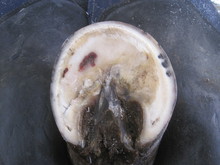Nothing catches the attention of a horse owner more quickly than a lame horse. He was fine last night after a trail ride, but this morning he is holding a front hoof off the ground and has an obvious limp when asked to move forward.

An abscess in a horse's foot
A horse with an abscess will have heat in the foot, a throbbing pulse and swelling around the coronary band.
© 2015 by Jacob Butler
Abscesses can be caused by a puncture from any variety of sharp objects â nails, staples, or rocks.
They can result from alternating climate - wet weather causes the feet to soften, allowing bacteria to enter the sensitive structures through the white line; the return of dry climate causes the hoof to harden and the bacteria are trapped.The gas produced by the bacteria causes pressure and pain between the insensitive and sensitive area.
Other causes include a bruise or corn, cracks in the hoof wall, and laminitis.
Abscesses are a common sequel (result) to laminitis since the sensitive structures are damaged, die and become necrotic (gangrene or rotten).
A horse with an abscess will have heat in the foot, a throbbing pulse and swelling around the coronary band. The horse might even be 3-legged lame and have a difficult time getting around. Horses may respond differently with one or more of the signs listed.
Abscesses may develop even with the best of care. Some horses have re-occurring abscesses that can be frustrating to all involved. These abscesses may be due to blood born bacteria, the weak integrity of a hoof due to genetics, or as a result of a past injury or trauma.
Farriers can help by monitoring the feet during regular routine appointments for trimming/shoeing. The hooves are kept a healthy length preventing extra strain by excess length.
Horse owners can help by picking the horseâs feet on a regular basis, and by being on the lookout for anything abnormal including penetrating objects. If there are any concerns, the farrier or veterinarian should be contacted.
Management of where horses are stabled including keeping the area clean is helpful in preventing injury that may cause abscesses. Good stable/barn management can prevent most common foot problems in horses.
Information from previous article by Jacob Butler
